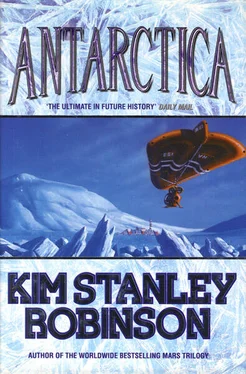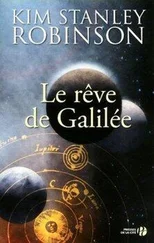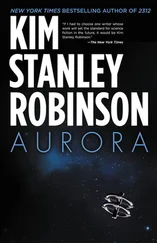Eventually a pure white Arnold reached them and crossed the snowbridge, and without giving him much of a chance for rest they were off again through the crevasse maze. Although they were crossing the Windless Bight, a strong breeze struck them in the face. Val waited for Arnold, who was puffing like a horse, his steamy breath freezing and falling in front of him as white dust. He shook his head at her; though she could see nothing of his face under his goggles and ski mask (which he ought to have pulled up, sweating as he was), she could tell he was grinning. “Those guys,” he said, with the intonation the group used to mean Wilson, Bowers, and Cherry-Garrard, the three members of the original Crozier journey. “They were crazy.”
“And what does that make us?”
Arnold laughed wildly. “That makes us stupid. ”
black sky
white sea
Ice everywhere, under a starry sky. Dark white ground, flowing underfoot. A white mountain puncturing the black sky, mantled by ice, dim in the light. An ice planet, too far from its sun to support life; its sun one of the brighter stars overhead, perhaps. Snow ticking by like sand, too cold to adhere to anything. Titan, perhaps, or Triton, or Pluto. No chance of life.
But there, at the foot of black cliffs falling into white ice, a faint electric crackle. Look closer: there—the source of the sound. A clump of black things, bunched in a mass. Moving awkwardly. Black pears in white tie. The ones on the windward side of the mass slip around to the back; they’ve taken their turn in the wind, and can now cycle through the mass and warm back up. They huddle for warmth, sharing in turn the burden of taking the brunt of the icy wind. Aliens.
Actually Emperor penguins, of course. Some of them waddled away from the newcomers on the scene, looking exactly like the animated penguins in Mary Poppins . They slipped through black cracks in the ice, diving into the comparative warmth of the −2°C. water, metamorphosing from fish-birds to bird-fish, as in an Escher drawing.
The penguins were the reason Val’s group was there. Not that her clients were interested in the penguins, but Edward Wilson had been. In 1911 he had wondered if their embryos would reveal a missing link in evolution, believing as he did that penguins were primitive birds in evolutionary terms. This idea was wrong, but there was no way to find that out except to examine some Emperor penguin eggs, which were laid in the middle of the Antarctic winter. Robert Scott’s second expedition to Antarctica was wintering at Cape Evans on the other side of Ross Island, waiting for the spring, when they would begin their attempt to reach the South Pole. Wilson had convinced his friend Scott to allow him to take Birdie Bowers and Apsley Cherry-Garrard on a trip around the south side of the island, to collect some Emperor penguin eggs for the sake of science.
Val thought it strange that Scott had allowed the three men to go, given that they might very well have perished, and thus jeopardized Scott’s chances of reaching the Pole. But that was Scott for you. He had made a lot of strange decisions. And so Wilson and Bowers and Cherry-Garrard had manhauled two heavy sledges around the island, in their usual style: without skis or snowshoes, wearing wool and canvas clothing, sleeping in reindeer-skin sleeping bags, in canvas tents; hauling their way through the thick drifts of the Windless Bight in continuous darkness, in temperatures between −40 and −75 degrees Fahrenheit: the coldest temperatures that had ever been experienced by humans for that length of time. And thirty-six days later they had staggered back into the Cape Evans hut, with three intact Emperor penguin eggs in hand; and the misery and wonder they had experienced en route, recounted so beautifully in Cherry-Garrard’s book, had made them part of history forever, as the men who had made the Worst Journey in the World.
Now Val’s group was in a photo frenzy around the penguins, and the professional film crew they had along unpacked their equipment and took a lot of film. The penguins eyed them warily, and increased the volume of their collective squawking. The newest generation of Emperors were still little furballs, in great danger of being snatched by skuas wheeling overhead, the skuas trying some test dives and then skating back on the hard wind to the Adelie penguin rookery at the north end of the cape. As always, Cape Crozier was windy.
Val’s clients finished their photography, and then were not inclined to stay and observe the Emperors any longer; the wind was too biting. Even dressed in what Arnold called spacesuits, a wind like this one cut into you. So they quickly regathered around Val. George told her they were hoping that they would still have time in the brief twilight to climb Igloo Spur and look for the circle of rocks that Wilson, Bowers, and Cherry-Garrard had left behind.
“Sure,” Val said, and led them to the usual campsite at the foot of Igloo Spur, and told them to go on up and have a look while there was still some twilight left. She would set a security tent and then follow. George Tremont, the leader of the expedition, which was not just another Footsteps re-enactment but a special affair, went into conference with Arnold, his producer, and the cinematographer and camera crew. They had to decide if they should film this moment as the true live hunt for the rock circle, or else find it today and then film a hunt tomorrow, in a little re-enactment of their own.
Val had very little patience for this kind of thing. Her GPS had the coordinates for the “Wilson Rock Hut,” as the Kiwi maps called it, and so they could have hiked up the spur and found the thing immediately. But no; this was not to be done. George and the rest wanted to film a finding of the rock igloo without mechanical aid. They seemed to assume that their telecast’s audience would be so ignorant that they would not immediately wonder why GPS was not being used. Val doubted this notion, but kept her thoughts to herself, and concentrated on setting up one of the big team tents, looking up once or twice at the gang tramping up the ridge, with their cameras but without GPS. It was pure theater.
After she had the tent up, and the sledges securely anchored, she hiked up the spine of the lava ridge. About five hundred feet over the sea ice the ridge leveled off, and fell and rose a few times before joining the massive flank of Mount Terror, Erebus’s little brother. As she had expected, she found her group still hunting for the rock hut, scattered everywhere over the ridge. In the dim tail end of the twilight this kind of wandering around could be dangerous; Cape Crozier was big and complicated, its multiple lava ridges separating lots of tilted and crevassed ice slopes running down onto the sea ice. When Mear and Swan had re-enacted the Worst Journey for the first time, in 1986, they had lost their own tent in the darkness for a matter of some hours, and if they hadn’t stumbled across it again they would have died.
But now the wandering had to be allowed; this was the good stuff, the treasure hunt. The camera operators were hopping around trying to stay out of each other’s views, getting every moment of it on their supersensitive film; it would be more visible on screen than it was to the naked eye. And everyone had a personal GPS beeper in their parka anyway, so if someone did disappear, Val could pull out the finder unit and track them down. So it was safe enough.
The searchers, however, were beginning to look like a troop of mimes doing impressions of Cold Discouragement. The truth was that the rock igloo that the three explorers had left behind was only knee high at its highest point, and both it and the plaque put there by the Kiwis had been buried in the last decade’s heavy snowfalls; though most of the snow here had been swept to sea by the winds, enough had adhered in the black rubble to make the whole ridge a dense stippling of black and white, hard to read in the growing darkness. Every large white patch on the broad ridge looked more or less like a knee-high rock circle, and so did the black patches too.
Читать дальше











